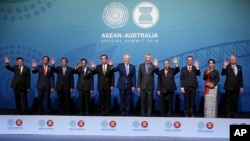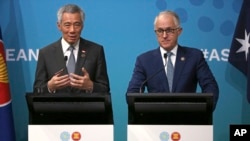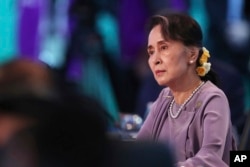Southeast Asian leaders and Australia’s prime minister Sunday called on North Korea to end its nuclear program and urged United Nations countries to fully implement sanctions.
Leaders at the first summit of the Association of Southeast Asian Nations, known as ASEAN, to be held in Australia issued a joint statement with Australia that also called for non-militarization and a code of conduct in the contested waters of the South China Sea, where China has become increasingly assertive.
ASEAN leaders also said they were working to provide humanitarian assistance for the continuing crisis involving Muslim Rohingya refugees fleeing Myanmar, with Australia’s Prime Minister Malcolm Turnbull saying the country’s leader Aang San Suu Kyi addressed the matter “comprehensively” in meetings Sunday.
North Korea statement
On North Korea, the ASEAN-Australia joint statement said: “We reiterate our support for the complete, verifiable, and irreversible denuclearization of the Korean Peninsula in a peaceful manner as well as initiatives toward establishing peace in the Korean Peninsula.”
The statement urged North Korea to “immediately and fully comply with its obligations under all relevant United Nations Security Council Resolutions” and called on all countries to implement sanctions.
President Donald Trump and South Korean President Moon Jae-in, who are both planning to meet North Korea’s leader Kim Jong Un this spring, last week pledged to maintain “maximum pressure” on his authoritarian regime and seek action on giving up his nuclear weapons.
Singapore’s Prime Minister Lee Hsien Long, the current chair of ASEAN, said the bloc had been encouraged by negotiations for the spring summit and had “noted reports of North Korea’s commitment to denuclearization and its pledge to refrain from further nuclear missile tests during this period.”
On South China Sea
On territorial conflicts with China, which like Australia is not a member of ASEAN, the statement said: “We reaffirm the importance of maintaining and promoting peace, stability, maritime safety and security, freedom of navigation and overflight in the region.”
“We emphasize the importance of non-militarization and the need to enhance mutual trust and confidence, exercise self-restraint in the conduct of activities and avoid actions that may complicate the situation,” the statement said.
China and the five countries that have conflicting territorial claims over the South China Sea, which include four ASEAN countries, plan to negotiate a code of conduct for one of the world’s busiest waterways aimed at reducing the risks of armed confrontations in the contested territories.
Lee said this was an issue for all ASEAN countries as it was “a security and stability question” that would “affect all ASEAN countries if it goes wrong.”
“This is an issue which we can manage which we can help to prevent from escalating, but it’s not an issue which can, in a definitive way, be solved in any short period of time,” Lee said, adding ASEAN was encouraged that code of conduct negotiations would begin this year.
Rohingya crisis
Lee said ASEAN policy meant it was “not able to intervene and to force an outcome” over the Rohingya crisis, in which more than 600,000 refugees have fled to neighboring Bangladesh amid a Myanmar military campaign the UN has called “ethnic cleansing.”
But Lee said the matter was a cause of concern for all of ASEAN as all members would be anxious “if there is any instability or any trouble” in fellow member countries.
Malaysian Prime Minister Najib Razak said on Saturday that the crisis was no longer solely a domestic issue for Myanmar, as fleeing Rohingya could be targets for terrorist radicalization.
Turnbull said the Rohingya issue was discussed by the leaders “very constructively” Sunday.
“Aung Sun Suu Kyi addressed the matter comprehensively at some considerable length herself,” he said.
“It’s a complex problem. She seeks support from ASEAN and other nations to provide help from a humanitarian and capacity-building point of view. Everyone seeks to end the suffering that has been occasioned by the events, the conflict, the dislocation, the displacement of persons.”
The ASEAN nations are Brunei, Cambodia, Indonesia, Laos, Malaysia, Myanmar, the Philippines, Singapore, Thailand and Vietnam.






